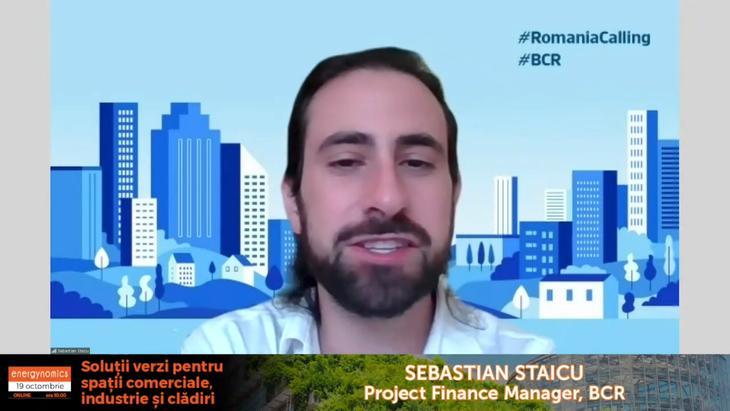In the projects we finance, BCR takes into account the national strategies and plans, but also the business model. BCR is going to launch a new energy efficiency product for companies, announced Sebastian Staicu, Project Finance Manager, BCR, during the ONLINE conference “Green solutions for commerce, industry and buildings”, organized by Energynomics.
“The product is addressed to several industries – both the energy sector and the consumer goods, food or real estate industry. We aim for these investments to generate a reduction of the bill by at least 30%, in order to have a relevant impact”, he said.
In the context of the Green Deal, banks have an increased responsibility to ensure green investment. The European Taxonomy involves a list of activities and investments with technical criteria, which determines whether or not a project is green. “The EU Taxonomy is becoming a reference for banks and investors. Large companies are to be obliged, starting with 2024, as in their annual reports, to report on their alignment to the European taxonomy of all revenues, CAPEX and OPEX”.
Advantageous loans will increasingly depend on the overall sustainability performance of some companies or the ESG rating (environmental, social and governance criteria), Staicu said. “We are looking at both financing green investment, and also financing companies with generally high sustainability performance,” he added.
At the same time, increased energy consumption will impose new efficiency targets, and national strategies and plans are very important when drawing up new financing products. “In terms of energy efficiency, Romania wants to achieve its 2030 energy efficiency objectives, on the one hand, through (1) a long-term renovation strategy, on the other hand, through (2) measures applied to energy-intensive consumers, (3) by developing the infrastructure of the network of electric charging stations and by (4) decarbonizing al transportation means”, said Staicu.
DOWNLOAD THE PRESENTATION OF SEBASTIAN STAICU
The energy market of the future comes with major changes. There is this trend towards the energy-as-a-service business model, which includes the production of decentralized electricity. Demand-response mechanisms, smart grids, smart homes and smart industrial applications are emerging and the emphasis is on electrifying the economy. “The consumer changes his role, he is no longer passive, but becomes active, he sells energy. The supplier, in turn, changes its role – it is no longer just a matter of selling energy to a consumer, but rather of taking over the entire responsibility of managing energy resources and [energy] infrastructure. This gave rise to these energy-as-a-service business models”, Staicu added.
At the same time, in financing energy efficiency projects using RES for own consumption, banks look very closely at the business model of the renewable projects, which can be owned or leased by consumers, either under external management or related to long-term bilateral energy contracts (PPAs). Various management models are taken into account, including ESCO-type ones.
Energy efficiency investments contribute to greenhouse gas emissions reduction, improve competitiveness for businesses and increase energy safety. EU puts energy efficiency at the core of its strategy to transform Europe into a climate-neutral continent until 2050.
The BCR Energy Efficiency product addresses private and or state companies, for investments in equipment modernization, technological lines upgrades and thermal rehabilitation of buildings, including cogeneration installations, investments that lead to energy consumption reduction and reduced GHG emissions.
The ONLINE conference “Green solutions for commerce, industry and buildings” was organized by Energynomics, with the support of our partners: BCR, Enel X Romania, EnergoBit, Schneider Electric, Simtel, Wiren.

